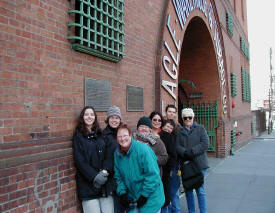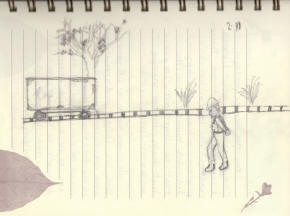|
February
12, 2002
In response to Walden
I saw
this man yesterday, and I know he has a story. I think I may find it
in Walden. He is a victim of progress – a man who has dedicated
himself to a life that no longer fits our high-tech, faster-moving modes of
living:
He
comes from a railroad family: both his father and grandfather, when not
fighting wars, worked on the railroad. His father was proud of him
when at the age of 16 he left school to work by his dad’s side. He
married his high school sweetheart after building them a small house on his
father’s land. His young wife helped his mom with the younger
siblings, the chickens, and the garden. A year later, their first
child was born – a strong son. They had two girls in the next three
years, but it was his son that he raised to be independent and hard-working. The
railroad paid good money, and he bought his wife her own car when she was
22 in 1962.
His
first disappointment came when his son shunned the railroad to go to
college. What can a man learn about life in college? His son
became a computer salesman for IBM in 1978. Now, he works for AOL in
Northern Virginia.
Today,
by the depressed railroad, he realizes he has been his own
slave-driver. He realizes his son, too, has been his own
slave-driver. The only difference is that he has been left behind in a
way of life that no longer exists. He fears his son, too, will be left
behind in 20 years.
He
thinks about what this land looked like and sounded like before the
railroad. The man that occupied the house overseeing the tracks died
years ago. He knows the man's grandchildren – one grandson stills
lives in that house. Perhaps one day he’ll ask if the old man ever
told stories about his childhood on the land. But today he has to
collect his own memories of his work on the railroad. Tonight, he and
his wife of 45 years are going to his retirement dinner. What will he
do tomorrow?
|




